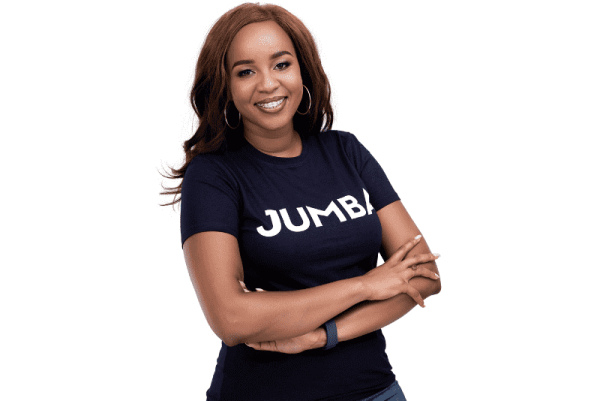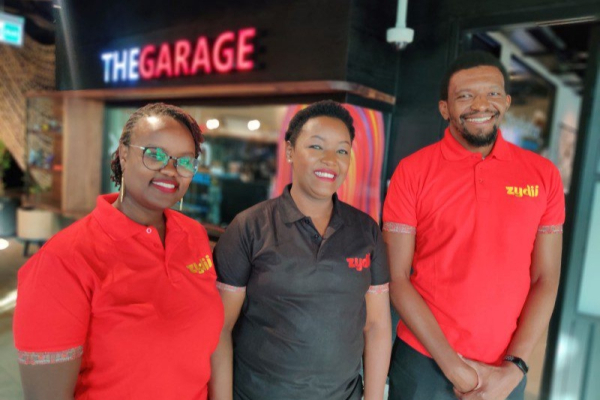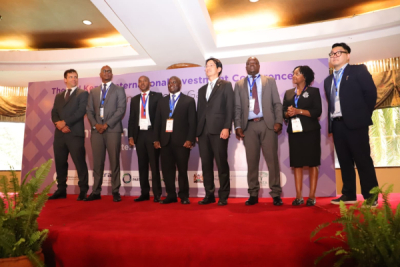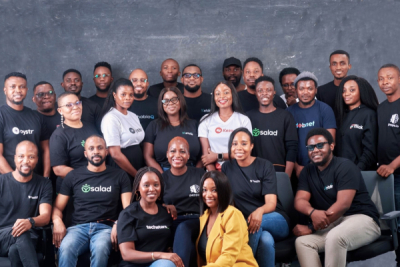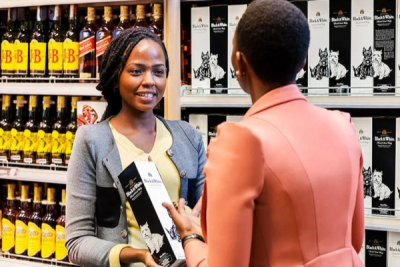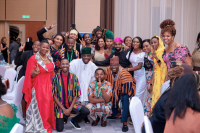She studied civil engineering and urban planning. After working with various logistics companies, she founded her own company, Jumba, to solve construction challenges in Africa.
Kagure Wamunyu (photo) is the co-founder and CEO of construction tech startup Jumba. The Kenyan-born entrepreneur studied engineering at North Carolina State University, graduating with a Bachelor's in Civil Engineering. She also holds a bachelor's in mathematics from Meredith College (2013) and a doctorate in sustainable urban development from Oxford University (2022)
In 2022, she co-founded (with Miano Njoka) the construction tech company Jumba to ease the supply of building materials. The startup developed a business-to-business platform that seamlessly integrates the building materials supply chain, offering not only a marketplace for building materials manufacturers and suppliers but also a single, reliable source of materials for hardware stores and construction companies. It ensures item delivery and transparency, enabling customers to track their deliveries in real time. The goods marketed on the platform are affordable, as Jumba makes sure that buyers pay no extra charges.
In February 2023, the start-up raised $4.5 million to further expand in Kenya. "Kenya will remain our core market, the opportunity is massive here. We plan to scale in this market to acquire more customers before we explore the next market," said Kagure Wamunyu at the time.
The latter, apart from leading Jumba, is also the co-owner of Lava Latte, a women-run café that offers a conducive space for work meetings and relaxation. Before founding her company in 2022, she was the Global Chief Operating Officer of Kobo 360, a pan-African technology logistics company.
In 2015, she joined Uber Kenya where she worked, for two years successively as Operations Manager and Country Manager. In 2017, she was hired by Bridge International Academies as Senior Strategy Director in East Africa.
In 2018, she made it to the Business Daily Africa’s list of the top 40 Under 40 women.
Melchior Koba
Zydii, a Kenyan platform that offers digital training in technical and soft skills useful for the development of businesses and their employees, has raised pre-seed funding for an undisclosed amount.
The company, which was co-founded in 2017 by computer scientist Joyce Mbaya, plans to use the funds to support its growth in Kenya and finance expansion in Nigeria and South Africa.
The Kenyan government is stepping up its efforts to accelerate the country's digital transformation. To achieve its objectives, the executive is counting on the support of international partners.
Korea Trade Centre (KOTRA) will support Kenya in the development of a master plan to guide the creation of the five digital cities selected by President William Ruto (Lamu, Dongo Kundu, Athi River, Sagana, and Naivasha). For that purpose, on Monday, May 29, in Nairobi, the Kenyan Ministry of ICT and Digital Economy and the KOTRA signed a memorandum of understanding.
The agreement also provides for the implementation of a smart mobility system encompassing an intelligent transport network using smart driving licenses.
According to ICT Principal Secretary John Tanui, the partnership is part of the government's strategies to create an enabling environment for innovation and emerging technologies. The Kenyan government "has played an enabling environment through various legal and regulatory frameworks to spur Kenya’s digital economy such as the National ICT Policy, Digital Economy Blueprint and National ICT Master Plan (2022-2032), among other policy interventions,” said John Tanui.
Indeed, when he came to power in September 2022, President William Ruto vowed his ambition to leverage digital tools for socioeconomic development. To this end, he planned various investments aimed at making the country a benchmark for digital transformation in Africa by 2027. Digital investments supporting this vision have been estimated at Ksh40 billion ($334 million).
The Smart Cities project should not only improve citizens' quality of life but also provide fertile ground for economic growth and job creation. It will offer solutions to the country's energy challenges by, among other things, implementing the Internet of Things (IoT) to strengthen ecosystems and enhance new technologies.
Samira Njoya
To grow and compete with their counterparts around the world, African businesses need stable, low-latency connectivity and digital tools to optimize their activities. Projects are being implemented to enable access to what they need.
Liquid Dataport, a subsidiary of connectivity company Liquid Intelligent Technologies, announced on Wednesday, May 31 the launch of its new fiber optic route linking Mombasa, Kenya, to Muanda in the Democratic Republic of Congo (DRC) via Uganda and Rwanda.
According to the release announcing the launch, this is the shortest route between East and West Africa and will reduce data transmission latency by 20 milliseconds.
“We have a significant number of wholesale, enterprise, and hyperscale customers along this route, and we fully support them in operating their global networks. The availability of our latest and shortest East to West route brings many proven economic and social benefits – from providing access to online educational resources to creating more jobs and driving the adoption of new technologies,” said David Eurin, CEO of Liquid Dataport.
This latest fiber optic route complements Liquid's previous achievement, completed in 2019, linking Dar es Salaam to Muanda on the west coast of the DRC via Zambia. It will bring more reliable and affordable broadband connectivity to over 40 million people who live and work in all the major cities along the route.
The partnership is part of Liquid Intelligent Technologies' "One Broadband Africa" initiative. The company is pursuing its strategy of conquering the African and global markets for broadband connectivity and digital services. In recent months, it has strengthened its presence in Africa by expanding into Nigeria, Egypt, and Algeria. On Thursday, May 25, the company signed an agreement with satellite telecom services provider Viasat to provide high-speed Internet connectivity services in West Africa.
According to Hardy Pemhiwa, CEO of Liquid Intelligent Technologies, this east-west axis will promote digital inclusion by bringing global traffic to the continent, but also by reducing the cost of broadband Internet access across the continent.
Samira Njoya
Techstars recently opened applications for its ARM Labs Lagos Techstars Accelerator program. The program is aimed at start-up founders who want to grow their businesses. Successful applicants will receive up to $120,000 in funding, plus access to a global network of investors, hands-on mentoring, and several other benefits. Applications are due by August 9 at https://apply.techstars.com/?source=nav.
British beverage company Diageo Plc recently announced the launch of its new Africa Digital Hub in Nairobi, Kenya.
The hub will serve Diageo's key markets in Africa, including Kenya, Nigeria, South Africa, and Ghana, and accelerate the company's digital transformation plans on the continent. It will be headed by Waithera Kabiru, former Head of Media Futures at EABL (East African Breweries Limited), a Kenya-based holding company that also manufactures beverages.
In the current digital age, accurate population data is a strategic asset to guide government planning. It informs the most effective actions to be taken before, during, or after any situation with direct or indirect consequences on the lives of millions of individuals.
Earlier today, Togo announced an agreement with French companies Atos and IDEMIA, for the development of a national electronic identification system. The two companies will design, build, test, and deploy a biometric solution that captures and process iris, face, and fingerprint data. On the sidelines of the GITEX Africa trade fair, taking place in Marrakech from May 31 to June 2, 2023, Alpha Barry, CEO of Atos Africa, said: "The biometric e-ID solution will play a crucial role in Togo's digital transformation and national development. Atos is committed to providing a reliable and secure solution that meets the needs of both government and citizens."
The digital solution will include a citizen portal, a mobile application, cybersecurity solutions, a central biometric system, enrolment kits, and a personalization system for the new electronic identity cards. It is a turnkey, integrated end-to-end solution to be built on a scalable infrastructure to meet Togo's current and future needs.
The French companies explain that the project also entails the opening of an Atos subsidiary in Togo to ensure the transfer of knowledge and skills to local staff to guarantee the independent and efficient operation of the system over the long term.
The national electronic identification system will support the national "e-ID Togo" project, which aims to allocate a unique identification number (UIN) to every resident in Togo. Thanks to the UIN and the biometric data collected, Togo will create a centralized, secure, and reliable database that will serve as a reference for verifying the identity of beneficiaries of public, private, or social services.
The project is part of the West African Unique Identification Program for Regional Integration and Inclusion (WURI), with an overall budget of $500 million financed by the World Bank.
Let’s note that the agreement was announced on the sidelines of the GITEX Africa trade fair being held in Marrakech (May 31-June 2).
Adoni Quenum, Marrakech
On January 13, 2022, the Pan-African Payment and Settlement System (PAPSS) was officially launched in West Africa. Despite its impressive benefits, this innovative solution is yet to be widely adopted.
On Monday, May 29, Kenya’s President, William Ruto (photo) called on his peers to take action for the widespread adoption of the Pan-African Payment and Settlement System (PAPSS). He asked them to encourage central and commercial banks to join the system. The official made the call during the African Private Sector Dialogue on the African Continental African Free Trade Area (AfCFTA) held in Nairobi.
“It is also imperative that we proactively seek a resolution to the disparities in currencies and the consequential impediments it poses to intra-African trade. Trade cannot take place without efficient and unified payment systems. [...] There is a mechanism where all our traders can trade in the local currency and we leave it to the Afreximbank to settle all the payments. We do not have to look for dollars; our businessmen will concentrate on moving goods and services and leave the arduous task of currencies to Afreximbank,” he said.
The PAPSS was launched in January 2022, one year after the operationalization of the AfCFTA. It aims to link African markets, enabling instant cross-border payments in local African currencies, whether for purchases, money transfers, salary payments, share trading, or high-value commercial transactions. According to Ghanaian President Nana Akufo-Addo, PAPSS is expected to save Africa 5 billion a year in payment transaction costs. However, most African countries are yet to embrace that innovative system. To date, only nine central banks, 40 commercial banks, and four switches have joined the PAPSS network.
For William Ruto, it is therefore urgent to take the first steps to get rid of the US dollar and mobilize for the adoption of PAPSS.
Samira Njoya
AfriLabs is an organization that promotes collaboration, knowledge sharing, and partnerships in the African tech ecosystem. It has one of the largest networks of innovation centers on the continent.
Networking organization AfriLabs was founded in 2011 to support African tech hubs by providing funding, mentorship, networking opportunities, and capacity-building resources for high-potential entrepreneurs. Led by ecosystem builder Anna Ekeledo, it has a network of 419 innovation centers in 52 African countries.
It offers capacity-building services for entrepreneurs, supports research, and organizes events and programs, among other things. It also provides coworking spaces and office space for entrepreneurs. Some of the programs it organizes include Catalytic Africa, an initiative launched in collaboration with the African Business Angels Network (ABAN) to build the skills of entrepreneurs, start-ups, hubs, and angel investors.
AfriLabs also supports initiatives like the Global EdTech Hub, a program funded by the Foreign Commonwealth and Development Office, the World Bank, and the Bill & Melinda Gates Foundation, to improve education technologies in developing countries.
Each year, AfriLabs organizes the AfriLabs Annual Gathering, which brings together leaders of innovation centers and ecosystem builders on the continent. The annual convention enables all players to learn more about the prospects in the business sectors covered. This year's gathering will take place in Kigali from October 11 to 13.
For its activities, AfriLabs has a wealth of partners including Facebook, Mozilla, GIZ, the French Development Agency, IBM, AfriHive, the World Bank, the Rockefeller Foundation, TechCabal, Google, the Ford Foundation, InfoDev, and Intel.
Melchior Koba
In a bid to digitize its whole administration and promote universal internet access, Egypt is working on a number of partnerships, including deals with German cooperation.
On May 31, the Egyptian Ministry of ICT signed a memorandum of cooperation with the German Agency for International Cooperation (GIZ) for the implementation of the first phase of the "Supporting e-Government and Innovation in the Public Administration (InnoPA)" project.
Under that memorandum, GIZ will support digital transformation and the promotion of e-government in Egypt. The agreement also includes the construction of an innovation laboratory that will develop an incubation program for emerging SMEs that want to build e-government applications to make government services accessible to citizens.
According to Amr Talaat, Minister of Communications and Information Technology, the memorandum is part of Egypt’s digital strategy and efforts to promote digital transactions in all aspects of life, and to achieve the transformation to a “paperless participatory digital government that relies on a solid and secure infrastructure".
Over the past ten years, the Egyptian government has made unceasing efforts to modernize its administration. Thanks to the reforms and flagship projects of its digital strategy, Egypt jumped 37 places in the global e-government index between 2003 and 2022. Egypt is now the 6th African country providing public services online, according to a sub-indicator of the UN e-Government Development Index (EGDI).
For Amr Talaat, this agreement represents a further leap forward in Egypt’s digital ambition and in the constructive cooperation between the German and Egyptian governments.
Samira Njoya
More...
He has over 12 years of experience in the pharmaceutical industry. As the co-founder and CEO of healthtech Pharmacy Marts, he transforms and modernizes the Egyptian health sector.
Ahmed Kadous (photo) is an Egyptian pharmacist who graduated from Cairo University in 2009 with a Bachelor's in Pharmaceutical Sciences. He also holds a master's in marketing from the Arab Academy of Science, Technology and Maritime Transport, which he obtained in 2011, and is the CEO of healthtech startup Pharmacy Marts.
He co-founded Pharmacy Marts, in 2021, with Haitham El-Ghotni, a senior business development and sales professional. His healthtech startup provides a digital marketplace connecting pharmacies and medical suppliers, facilitating the acquisition of medicines, medical supplies, and cosmetics.
Pharmacy Marts enables medical suppliers to list their products and offers online, allowing pharmacists to check them out, compare their prices, and source for the best deals. The startup also works with financial institutions to enable pharmacists to increase their income through BNPL (buy now, pay later) financing. Recently, it was nominated at the pre-selection event for the third edition of Egypt's Entrepreneur Awards. Ranked in the "Digital Solutions and Customer Experience Awards" category, Pharmacy Marts has been recognized as one of the country's top start-ups that transform and modernize the pharmaceutical industry.
Ahmed Kadous, one of the men who made it possible, debuted his professional career in 2009, as a Pfizer medical representative. In 2012, he joined Novartis as Executive Medical Representative. In his 9 years with the company, he successively held the positions of Marketing Manager, Market Access Manager, and Pricing Manager.
In 2021, he was appointed Patient Value Access Therapeutic Area Manager for Takeda, a pharmaceutical manufacturing company. He was also responsible for the company's market access.
Thanks to Pharmacy Marts, in 2022, Ahmed Kadous was awarded the prize for the best start-up in North Africa issued by Africa Arena. In 2023, his company was named one of the 15 most promising healthtech start-ups in Africa at the AfricaTech Awards. He also received the Outstanding Leadership Award at the Health 2.0 conference, and Pharmacy Marts received the Best Series A Start-up Award from Africa Arena.
Melchior Koba
The Gauteng provincial government is committed to the well-being and security of its population. To achieve this, the executive has turned to digital technology, which offers suitable technologies for this purpose.
On Thursday, May 25, Gauteng's Department of e-Government presented the 2023/2024 budget, as well as the digital projects planned by the province's Department of Cooperative Governance and Traditional Affairs (COGTA).
According to Mzi Khumalo (photo, center), Gauteng's executive council member for e-government, research, and development, the ZAR1.7 billion ($86 million) budget prioritizes key ICT projects like the implementation of an e-policing strategy in the province.
“Amongst other projects, the department has sought to prioritize the procurement and management of crime-fighting technologies to establish e-policing for the Gauteng Province,” said Mr. Mzi Khumalo.
The sum allocated has enabled Gauteng province to acquire facial recognition CCTV cameras in Diepsloot, one of the areas identified as crime hotspots. The aim, according to Gauteng Premier Panyaza Lesufi, is to enable police to monitor the area 24 hours a day, and to highlight the ability of CCTV cameras to produce data that can be used in the fight against crime.
Other projects will also be implemented, including the acquisition of tracking devices to monitor vehicles, firearms, and other assets used in crime-fighting, and the manufacture of electronic panic buttons enabling the population to quickly contact the emergency services when in distress.
The Gauteng administration is also planning to develop a payment engine for cashless transactions for all provincial government departments and entities. There are also plans to continue providing services over the Gauteng broadband network (by providing Wi-Fi connectivity to schools, libraries, hospitals, community centers, and homes), to bring new services online, and to strengthen the youth’s ICT skills.
Samira Njoya
More than an academy or an incubator, MEST Africa is a large community catalyzing tech entrepreneurship in Africa. It is committed to innovation to build a promising tech ecosystem on the continent.
In the rapidly growing African tech landscape, MEST Africa is undoubtedly one of the notable incubators and communities advancing things. Founded in 2008 by Jorn Lyseggen, founder of the Meltwater Foundation, it trains and supports the most promising technology entrepreneurs, opening up new avenues for innovation and economic growth.
It is based in Accra, with centers in Lagos, Cape Town, and Nairobi. It is all by itself an Africa-wide technology entrepreneur training program, an in-house seed fund, and a network of incubation centers for African tech startups. It provides African technology entrepreneurs with technology training, financing, and support in software development and business and communications.
MEST Africa's year-long training program is designed to create an immersive, hands-on learning experience. Students are exposed to a balanced combination of theoretical courses, practical projects, and company internships. Its members have access to a global network of experts knowledgeable in subjects like sales, engineering, marketing, and more.
As an incubator, it supports graduates who have successfully convinced its Board of Directors of the prospects of their startups. These graduates receive seed funding and are allowed to access a collaborative workspace and experienced mentors to guide them through their entrepreneurial journey.
The tech entrepreneurship support agency also regularly organizes, in collaboration with its partners (GIZ, Amazon Web Services, Microsoft, Samsung, Mastercard, and Impact Lab, among others), events, conferences, and workshops to foster collaboration, knowledge sharing, and networking opportunities between entrepreneurs, investors, and industry professionals. One of its initiatives is Edtech Monday, a weekly show broadcasted live on Facebook and on CITI FM (Ghana) every Monday.
MEST Africa's impact has an undeniable impact on the African tech ecosystem. Since its creation, it has trained over 1,000 tech entrepreneurs and financed more than 80 companies, helping create over 750 jobs on the continent. It boasts support to startups in sectors like e-commerce, agritech, fintech, healthcare technology, edtech, AI, and more.
The next cohort of its training program, consisting of 60 students as usual, will start in August 2023.
Melchior Koba
During his presidency, which began in May 2015, outgoing president, Muhammadu Buhari, successfully showcased Nigeria on the international tech scene. His successor wants to do even better over the next four years.
Bola Tinubu (photo), Nigeria’s new President sworn in on Monday, wants to leverage digital technologies to further develop the country.
To this end, he has drawn up a program focusing on seven areas: innovation and entrepreneurship, service provision and outsourcing, technology manufacturing, e-commerce, digitization of public services, broadband, and blockchain.
His team plans to implement policies to support local financing opportunities and access to capital to encourage foreign investors to continue investing in Nigeria. Policies to train and empower young people in ICT will also be developed.
They also plan to develop the e-commerce sector by upgrading the national transport infrastructure to provide nationwide services and meet the needs of consumers across the country.
The new government also wants to invest in the manufacture of technological products since it presents another major opportunity for job creation. Imported smartphones will be gradually replaced by local products from local assembly plants built to develop the tech manufacturing sector.
Concerning blockchain, the new President plans to reform government policy to encourage the prudent use of this new technology in finance and banking, identity management, revenue collection, and the use of crypto-assets.
Aware that all these projects will not come to fruition without good Internet connectivity, the new president is set on boosting broadband connectivity and providing high-speed internet to 90% of the population within the next two years. Currently, Nigeria's national fiber optic network is 98% complete, according to the government.
Universal Internet coverage will enable the use of public services, with further digitization expected for the coming months, we learn.
Mr. Tinubu targets one million jobs created in the ICT sector in his first 24 months in office.


